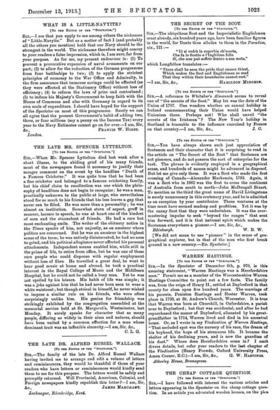THE LATE MR. SPENCER LYTTELTON.
[To THE EDITOR OP THE " SPECTATOR."] Sin,—When Mr. Spencer Lyttelton died last week after a short illness, to the abiding grief of his many friends, most of the newspapers found it necessary to justify their meagre comment on the event by the headline " Death of a Famous Cricketer." It was quite true that he had been a fine cricketer and belonged to a famous cricketing family, but his chief claim to recollection was one which the philo- sophy of headlines does not begin to recognize : he was a man, practically unknown to the public at large, who nevertheless stood for so much to his friends that his loss leaves a gap that never can be filled. He was more than a personality ; he was almost an institution. Somewhat stern of aspect, gruff in manner, laconic in speech, he was at heart one of the kindest of men and the staunchest of friends. He had a rare but most enchanting smile. The writer of the obituary notice in the Times speaks of him, not unjustly, as an amateur where politics are concerned. But he was an amateur in the highest sense of the term; he was entirely disinterested, he had no axes to grind, and his political allegiance never affected his personal attachments. Independent means enabled him, while still in the prime of life, to retire from office, but he was one of those rare people who could dispense with regular employment without loss of fibre. He travelled a great deal, he went to hear good music at home and abroad, he took a practical interest in the Royal College of Music and the Middlesex Hospital, but he could not be called a busy man. Yet he was not spoiled by his leisure. His habit of life was simple ; it was a joke against him that he had never been seen to wear a white waistcoat ; but though stoical in himself, he never wished to impose a similar rule on his friends, who were often surprisingly unlike him. His genius for friendship was strikingly exhibited by the congregation assembled at the memorial service held at St. Margaret's, Westminster, last Monday. It surely speaks for character that so many people, differing so widely in their aims and natures, should have been united by a common affection for a man whose dominant trait was an inflexible sincerity.—I am, Sir, &c.,
C. L. G.


























































 Previous page
Previous page